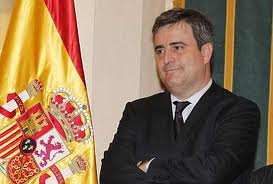By Mark Baber
December 2 – The death of Deportivo de La Coruña fan Francisco José Romero Taboada before the match between and Atlético de Madrid on Sunday has dominated Spain’s news agenda, with the Spanish government saying the death marks a watershed and Ultra groups will be banned from stadiums.
The Secretary of State for Sport, Miguel Cardenal (pictured), told reporters on Monday: “There will be a before and after this event in football and you will be able to see that soon. It has been suggested to us that we draw up a list of the ultra groups in order to expel them from the stadiums and fix a time to carry that out. There is also a proposal [from the LFP] to close stands in stadiums like in other European countries.
“I have already passed these plans on to the clubs and you can have no doubt that this will be achieved. It’s a journey that some clubs have already undertaken. The commitment is clear and determined – and I’m sure it will be efficient.”
According to Cardenal: “There are many criminal lists, but we are talking about creating an official list so that these measures can be taken.”
Cardenal added, “Whoever collaborates with radicals will be sanctioned extremely harshly”,
Whilst the precise circumstances of Taboada’s death are yet to be established, it appears he was killed by a blow to the head during an early morning large-scale fight between the left wing ‘Riazo Blues’ group of Deportivo ultras and an ultra-right wing group of Atletico Madrid fans known as ‘Frente Atletico’ with other groups of fans also involved. Whether the fight was organised beforehand, or whether the ‘Riazos Blues’ were ambushed on the way to the stadium, is a matter of dispute.
Secretary of State for Security Francisco Martinez revealed that 21 arrests had been made following Sunday’s clashes including “12 from Riazor Blues (Deportivo), six from Frente Atletico, two from Bukaneros (Rayo Vallecano) and one fan of Alcorcon.”
Romero, who was a member of the Riazor Blues, was at some point thrown into the Manzanares river and his death is clearly giving impetus to the process of tackling the gang culture which has sprung up around Spanish clubs and which clubs have shown varying degrees of willingness to acknowledge as a problem or take measures to prevent.
Whilst many football fans and club officials would welcome the end of the ultra groups, others have argued they add atmosphere and passion to the terraces and it is unfair to tar all ultras with the same brush. Others, such as Atletico president Enrique Cerezo, have argued the problem is a social, not a football problem and has “nothing to do with us.”
With Romero’s mother expressing the hope that her son’s death will help put an end to football violence “once and for all” Cerezo’s position seems increasingly unlikely to be acceptable to the Spanish public or to the Spanish government.
Contact the writer of this story at moc.l1744973095labto1744973095ofdlr1744973095owedi1744973095sni@r1744973095ebab.1744973095kram1744973095

